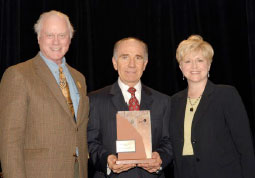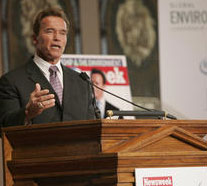 The Alternative Fuel Vehicle Institute (AFVi) recently recognized outstanding leadership in the alternative fuels and vehicles industry at the 13th Alternative Fuels & Vehicles National Conference & Expo 2007.
The Alternative Fuel Vehicle Institute (AFVi) recently recognized outstanding leadership in the alternative fuels and vehicles industry at the 13th Alternative Fuels & Vehicles National Conference & Expo 2007.
General Motors received the Green Award for the “Live Green Go Yellow” marketing and advertising campaign.
 American Honda was honored with the Green Fleet Award for “leadership and consistency in manufacturing vehicles that provide fleets and customers with the greenest choices around.” Pictured, Dan Bonawitz, Vice President of Corporate Planning and Logistics for American Honda, accepted this award from actor Larry Hagman and AFVi Executive Director Annalloyd Thomason.
American Honda was honored with the Green Fleet Award for “leadership and consistency in manufacturing vehicles that provide fleets and customers with the greenest choices around.” Pictured, Dan Bonawitz, Vice President of Corporate Planning and Logistics for American Honda, accepted this award from actor Larry Hagman and AFVi Executive Director Annalloyd Thomason.
The Industry Innovation Award was presented to James Harger of Clean Energy, Westport Innovations CEO Mike Gallagher, Mark Zucker and Andy Douglas of Inland Kenworth.
The Industry Pioneer of the year was Anne Smith with the Southern California Gas Company, and philanthropist T. Boone Pickens was honored with the Industry Vision Award.


 According to a company release, the grand opening event for POET Biorefining in Corning, Iowa will be held on May 4.
According to a company release, the grand opening event for POET Biorefining in Corning, Iowa will be held on May 4.  Venezuela’s Hugo Chavez and Brazil’s Luiz Inacio Lula da Silva apparently put their heads together and worked out a compromise on ethanol at this week’s first-ever South American Energy Summit.
Venezuela’s Hugo Chavez and Brazil’s Luiz Inacio Lula da Silva apparently put their heads together and worked out a compromise on ethanol at this week’s first-ever South American Energy Summit. The
The  Meanwhile, the
Meanwhile, the  The
The 
 As we close in on income tax deadline day, biodiesel advocates are blasting the U.S. Internal Revenue Service for allowing petroleum producers to cash in on the same dollar-a-gallon tax credit orginally set up to help the fledgling biodiesel industry.
As we close in on income tax deadline day, biodiesel advocates are blasting the U.S. Internal Revenue Service for allowing petroleum producers to cash in on the same dollar-a-gallon tax credit orginally set up to help the fledgling biodiesel industry. “Certain powerful oil companies have managed to get the government to expand the definition of a separate provision that was added into the biodiesel tax credit law late in the legislative process,” said Joe Jobe, CEO of the National Biodiesel Board (NBB). “It’s our belief that this credit was developed to help a specific emerging technology, and not to further subsidize existing petroleum refineries.”
“Certain powerful oil companies have managed to get the government to expand the definition of a separate provision that was added into the biodiesel tax credit law late in the legislative process,” said Joe Jobe, CEO of the National Biodiesel Board (NBB). “It’s our belief that this credit was developed to help a specific emerging technology, and not to further subsidize existing petroleum refineries.” “You have to make things cool, you have to make things sexy and cutting edge,” he said. “And so we don’t have to take away the cars from the people, the SUVs, the Hummers, and the muscle cars. No. That formula is a formula for failure. Instead, what we have to do is make those muscle cars and those SUVs and those Hummers more environmentally muscular. That is what we have to do. This is why now one of my Hummers runs on biofuel, and the other one of my Hummers runs on hydrogen fuel.”
“You have to make things cool, you have to make things sexy and cutting edge,” he said. “And so we don’t have to take away the cars from the people, the SUVs, the Hummers, and the muscle cars. No. That formula is a formula for failure. Instead, what we have to do is make those muscle cars and those SUVs and those Hummers more environmentally muscular. That is what we have to do. This is why now one of my Hummers runs on biofuel, and the other one of my Hummers runs on hydrogen fuel.” According to the ND
According to the ND  A Dodge Viper fueled with 85 percent ethanol set a world speed record when it hit 189 mph last week on the runway at the Mojave Air & Space Port.
A Dodge Viper fueled with 85 percent ethanol set a world speed record when it hit 189 mph last week on the runway at the Mojave Air & Space Port. Company president Nile Ramsbottom said the company looked at Emporia because of its location and an ongoing partnership with soybean processor Bunge North America.
Company president Nile Ramsbottom said the company looked at Emporia because of its location and an ongoing partnership with soybean processor Bunge North America.